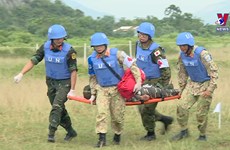Low vaccination rate puts hep-B target ‘out of reach'
The World Health Organisation has warned Vietnam and eight other
countries in the Western Pacific that they would not be able to reduce
the hepatitis B infection rate in children to less than 2 percent by
next year due to their low vaccination coverage.
The World Health Organisation has warned Vietnam and eight other
countries in the Western Pacific that they would not be able to reduce
the hepatitis B infection rate in children to less than 2 percent by
next year due to their low vaccination coverage.
It had pledged to support the nine countries – Cambodia , Kiribati , Laos , Papua New Guinea , the Philippines , Samoa , Solomon Islands , and Vanuatu being the others – that face significant challenges in combating the disease.
The major cause of the low vaccination rates is the large number of births that occur at home without skilled birth attendants, making it difficult to deliver vaccines and other care services, it said.
The countries target reducing the hepatitis B rate in children to less than 1 percent in future.
Dr Shin Young-soo, WHO Regional Director for the Western Pacific, said reaching the targets is crucial and doable.
"Focused, concerted action is essential, especially in the countries that continue to suffer from high rates of mother-to-child transmission," he said.
The region accounts for almost half the global incidence of hepatitis B while having only a third of the population.
More than 90 percent of countries around the globe are now including the vaccine against hepatitis B in routine childhood immunisation programmes, giving babies life-long protection.
July 28 has been designated as World Hepatitis Day, serving as an opportunity to promote specific actions towards controlling the disease./.
It had pledged to support the nine countries – Cambodia , Kiribati , Laos , Papua New Guinea , the Philippines , Samoa , Solomon Islands , and Vanuatu being the others – that face significant challenges in combating the disease.
The major cause of the low vaccination rates is the large number of births that occur at home without skilled birth attendants, making it difficult to deliver vaccines and other care services, it said.
The countries target reducing the hepatitis B rate in children to less than 1 percent in future.
Dr Shin Young-soo, WHO Regional Director for the Western Pacific, said reaching the targets is crucial and doable.
"Focused, concerted action is essential, especially in the countries that continue to suffer from high rates of mother-to-child transmission," he said.
The region accounts for almost half the global incidence of hepatitis B while having only a third of the population.
More than 90 percent of countries around the globe are now including the vaccine against hepatitis B in routine childhood immunisation programmes, giving babies life-long protection.
July 28 has been designated as World Hepatitis Day, serving as an opportunity to promote specific actions towards controlling the disease./.













